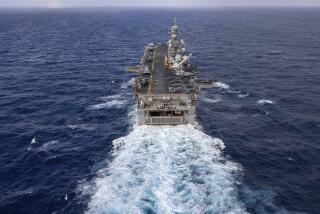Pentagon OKs Danger Pay for Gulf Duty
WASHINGTON — The Reagan Administration has authorized danger pay bonuses for 10,000 servicemen involved in the U.S. naval escort of Kuwaiti oil tankers in the Persian Gulf region, the Pentagon announced Wednesday.
The decision will provide an extra $110 a month in “imminent danger” premiums to the men serving on warships in the Persian Gulf, the Strait of Hormuz and a small part of the Gulf of Oman. Also eligible are U.S. troops stationed in Kuwait and Bahrain and pilots based in Saudi Arabia or on carriers operating in the North Arabian Sea.
The announcement prompted Democratic critics of the gulf operation to renew their demands that President Reagan seek formal authorization for the escort under the War Powers Resolution.
“The Administration can’t have it both ways. . . . I don’t see how the Administration can avoid invoking the War Powers Act” now that the bonus has been authorized, said Sen. Carl Levin (D-Mich.).
Under the resolution, the President is required to notify Congress when he has introduced U.S. forces into combat or situations where “imminent involvement in hostilities” is likely. After notification, he is required to end the operation within 60 days unless Congress authorizes the action or grants an extension.
More than 100 members of Congress, all of them Democrats, have asked a federal court in Washington to order Reagan to invoke the resolution. The lawsuit, filed Aug. 7, is pending.
However, Pentagon and White House officials, drawing a fine legal distinction, said that granting the bonus does not mean that the resolution should be invoked.
“We got our latest convoy out quite successfully, but we’ll continue to examine the situation, and should--in the judgment of the lawyers--War Powers be applicable, we will make the appropriate notification to Congress . . .,” National Security Adviser Frank C. Carlucci said Wednesday during a briefing for reporters.
Pay Is Merited
Pentagon officials said that danger pay is mandated by law when there is a “threat of physical harm or imminent danger.” The War Powers Resolution, they said, is triggered only by combat or “imminent involvement” in warfare.
Deputy Assistant Secretary of Defense David J. Armor, the Pentagon’s manpower chief, said that the pay is merited by the threat of “terrorist action of various kinds.” He also noted that severe heat and dust in the gulf region add to the stress felt by service personnel.
“There’s no question that this is arduous duty,” Armor said.
The 10,000 troops who will receive the bonus are involved in escorting 11 Kuwaiti oil tankers being re-registered as American ships. Two tankers, one of them not part of an escorted convoy, have hit mines in the gulf in the past month. Tension continues to grow in the region because of Iranian threats against shipping.
The Pentagon has ordered 47 ships and an estimated 25,000 personnel to conduct and support the escort operation, one of its biggest buildups since the Vietnam War.
Fifteen thousand of the servicemen do not qualify for the bonus because they are serving outside the immediate escort area.
Armor estimated that the special pay in the gulf area would cost about $1.1 million a month, a small part of the cost of the overall mission. Pentagon officials have said that the gulf operation is costing about $1 million a day more than normal peacetime Navy operations.
The Pentagon said it is providing danger pay to U.S. military personnel in five countries--El Salvador, Lebanon, Sudan, Peru and Colombia. Those in Sudan are endangered by fighting in the civil war there, and personnel in Peru and Colombia are considered possible targets of drug smugglers. The Salvadoran government is battling leftist rebels, and strife between different factions continues in Lebanon, where a handful of servicemen are on duty at the U.S. Embassy in East Beirut.
More to Read
Sign up for Essential California
The most important California stories and recommendations in your inbox every morning.
You may occasionally receive promotional content from the Los Angeles Times.










